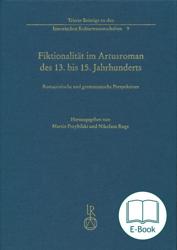Contrary to former studies the volume focusses on the opportunities of fictional world concepts in the Arthurian narrations of the European Middle Ages apart from the factitive dictate. It examines phenomena of narration that opened spaces of story-telling to French and German premodern literatures but are sealed to temporary educated literature.
The volume focusses on the French and German Arthurian Romances from the 13th to the 15th century; the articles mostly hearken back to an interdisciplinary symposium at the Historisch-Kulturwissenschaftliche Forschungszentrum Trier in September 2011. The controversial research about the content and the specific character of fictionality-concepts in the Arthurian Romance is, as is known, not new. It was coined crucially by the postulate that fictional world concepts of the premodern vernacular literature are only conceivable in a causally bound system of perceptions and values embedded in the idea of the observable and divine legitimized reality outside of the literature. Fictionality appears accordingly as a mediated institution, so to speak as a secondly ranked knowledge space. Opposed to that, in this volume the opportunities of fictional world concepts apart from factitive rigor, coherence or contingency that are especially prominent in the younger Arthurian Romance are being explored. Fictional narration is seen as an instrument to open up agitation spaces far beyond a narrative logic that is related to knowledge of the world outside of literature. So the volume enriches a debate that has taken place in the Medievalism-Philologies for a long time by examining marginally treated phenomena of narration in a genre of vernacular literature in the European Middle Ages.
„Diese Sammlung von zehn germanistischen und romanistischen Studien mit einer Einführung von Nikolaus Ruge [...] geht von einem Fiktionalitätsbegriff aus, der im jüngeren Artusroman, so die Hgg., ,die Möglichkeiten fiktionaler Weltentwürfe jenseits von faktitiver Stringenz, Kohärenz oder Kontingenz auslotet’, wobei sich, so Ruge, ,in den Beiträgen [...] eine Reihe methodischer Tendenzen herauskristallisieren’ sollen, ,für eine systematischere Erfassung dessen, was im 13. Jahrhundert an fiktionalitätsaffinen Erzählmodellen und -verfahren zur Verfügung stand’. Als Ausgangspunkt hierfür dient die Absenz vernakulärer zeitgenössischer Poetiken, die – unter Berücksichtigung von deren Historizität und kulturellen Gebundenheit – eine Rekonstruktion von Fiktionalitätssignalen am Textzeugnis über den discours statt über die histoire notwendig macht. Dieses Ziel verfolgen [..] die neun Germanisten und drei Romanisten.“
Von: Angelica Rieger
In: Das Mittelalter, 2017, Band 22, Heft 2, S. 487-489.
Prof. Dr. Martin Przybilski (born in 1970); University studies of German, History and Classical Philology in Paderborn and Würzburg
Since 2003: professor of Medievalism at the University of Trier
Research focus: Wolfram von Eschenbach, Jewish-Christian cultural exchange, Arthurian Romance, literarily portrayals of war
Dr. Nikolaus Ruge (born in 1971); University studies of German and Sociology in Bamberg
Since 2006: member of academic staff in the field of Medievalism at the University of Trier
Research focus: Language History, variance and medieval textuality, Arthurian Romance
The new publication series entitled “Trierer Beiträge zu den historischen Kulturwissenschaften” (Trier Papers in Historical Cultural Studies) aims at being a forum for papers in the area of Cultural Studies, which focus on historical and interdisciplinary research. In addition to essay collections and conference proceedings, the series also covers monographic studies as well as exhibition catalogues.
The editor of the book series is the Executive Board of the “Historisch-Kulturwissenschaftliche Forschungszentrum” (HKFZ) Trier (Trier Historical Cultural Research Centre) at Trier University. The Research Centre is financed in line with the research initiative of Rhineland-Palatinate. The HKFZ’s current research topic is called “Räume des Wissens – Orte, Ordnungen, Oszillationen” (“Spaces of Knowledge – Places, Orders, Oscillations”). In collaboration with national and international partners, groups of linked projects work on this topic at Trier University.


 Sample
Sample